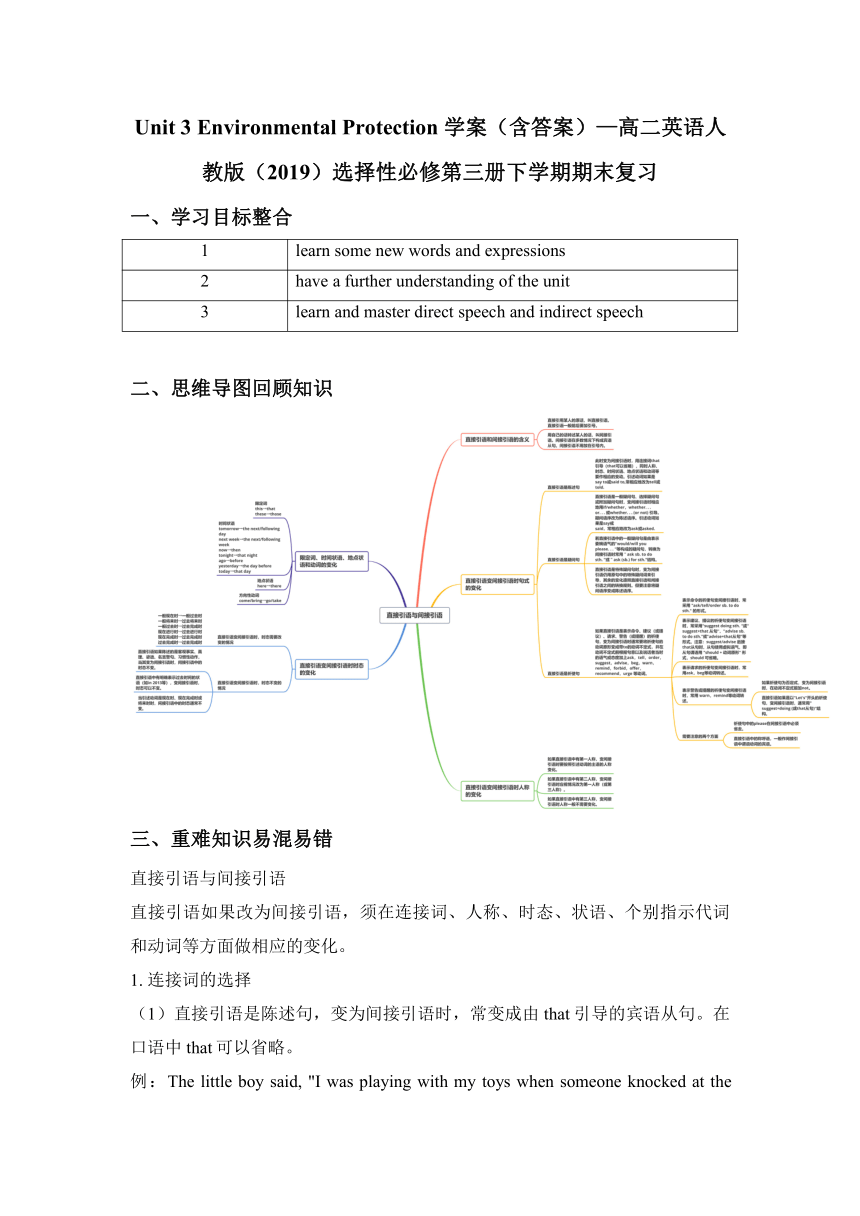
Unit 3 Environmental Protection 学案(含答案)—高二英语人教版(2019)选择性必修第三册下学期期末复习 一、学习目标整合 1 learn some new words and expressions 2 have a further understanding of the unit 3 learn and master direct speech and indirect speech 二、思维导图回顾知识 三、重难知识易混易错 直接引语与间接引语 直接引语如果改为间接引语,须在连接词、人称、时态、状语、个别指示代词和动词等方面做相应的变化。 1. 连接词的选择 (1)直接引语是陈述句,变为间接引语时,常变成由that引导的宾语从句。在口语中that可以省略。 例:The little boy said, "I was playing with my toys when someone knocked at the door." 小男孩说:"我在玩我的玩具,这时有人敲门。" (直接引语为陈述句) →The little boy said (that) he was playing with his toys when someone knocked at the door. 小男孩说,他在玩他的玩具,那时有人敲门。 (间接引语为that引导的宾语从句) (2)直接引语是一般疑问句、选择疑问句或反意疑问句时,间接引语中用whether(...or...或...or not)或if引导。 例:Mother said to her daughter, "Are you satisfied with your new room " 妈妈对她的女儿说:"你对你的新房间满意吗?" (直接引语为一般疑问句) →Mother asked her daughter whether/if she was satisfied with her new room. 妈妈问她女儿是否对她的新房间满意。 (间接引语改为whether/if引导的宾语从句) (3)直接引语为特殊疑问句时,间接引语仍用原句中的特殊疑问词来引导,其余的变化遵照直接引语和间接引语之间的转换规则来进行。 例:"When will the sports meet be held " he said. 他说:"什么时候举行运动会?" (直接引语为特殊疑问句) →He asked when the sports meet would be held. 他问什么时候举行运动会。 (间接引语改为由特殊疑问词引导的宾语从句) 注意: (1)直接引语是陈述句时,若变为间接引语,主句谓语动词"said to sb."常改为told sb.。 (2)直接引语是疑问句时,如果主句中谓语动词是said,则将其改为asked。 (3)疑问句的直接引语变间接引语时,要把疑问语序变成陈述语序。 练习:将直接引语变换为间接引语 ① The patient asked, "Is Dr. Li at the hospital " →The patient asked whether/if Dr. Li was at the hospital. ② "Who lost the key to the room " asked Miss Green. →Miss Green asked who had lost the key to the room. 2. 人称的变化 直接引语变为间接引语时,人称代词要根据转述人立场的变化作相应的改变。 记忆口诀:一随主,二随宾,第三人称不更新。 (1)"一随主" 指在直接引语变间接引语时,如果从句中的主语是第一人称或被第一人称修饰。从句中的人称要按照主句中主语的人称变化。 例:Mary said, "I want to have a computer of my own." 玛丽说,"我想拥有一台我自己的电脑。" →Mary said that she wanted to have a computer of her own. 玛丽说她想拥有一台自己的电脑。 (2)"二随宾" 指直接引语变间接引语时,若从句中的主语及宾语是第二人称或被第二人称修饰,从句中的人称要跟引号外的主句的宾语一致。 例:Her colleague said to her, "Who did you ask for a leave " 她的同事对她说,"你向谁请了假?" →Her colleague asked her who she had asked for a leave. 她的同事问她向谁请了假。 (3)"第三人称不更新" 指直接引语变间接引语时,如果从句中的主语及宾语是第三人称或被第三人称修饰,从句中的人称一般不需要变化。 例:The workers said, "The leaders often make the workers work extra hours." 工人们说:"领导经常让工人们加班。" ... ...
~~ 您好,已阅读到文档的结尾了 ~~